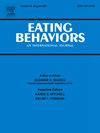The moderating effect of weight loss intentions on dynamic associations between weight suppression and disordered eating
IF 2.4
3区 医学
Q2 PSYCHIATRY
引用次数: 0
Abstract
Objective
Weight suppression refers to the difference between one's current and highest previous weight in adulthood and has been associated with development of eating pathology. Previous research has been agnostic as to whether reported weight suppression reflects deliberate weight control behavior, and few studies have assessed whether weight loss that occurs unintentionally (e.g., due to illness) is longitudinally associated with eating pathology.
Method
Undergraduates at a Canadian university (N = 661; 81.4 % female) completed three online surveys over six months. Longitudinal multilevel models examined the interaction of within-person fluctuations in weight suppression and between-person differences in weight loss intentions on binge eating, dietary restriction, and body dissatisfaction.
Results
Of participants who reported weight suppression at baseline, 47.6 % indicated that their weight loss was unintentional. Compared to participants endorsing unintentional weight suppression, participants endorsing intentional weight suppression showed greater body dissatisfaction and binge eating across the assessment period (β = 3.64, p ≤ .001 and β = 2.32, p ≤ .001). Significant within-person effects were found only for restriction, indicating that when individuals reported greater weight suppression, they also reported more restrictive eating (β = 0.89, p = .004). Contrary to hypotheses, associations between within-person fluctuations in weight suppression and disordered eating outcomes did not differ by weight loss intentions.
Discussion
Findings suggest that whether weight suppression is intentional may influence mean levels of disordered eating but may have limited influence on within-person fluctuations in weight suppression and disordered eating severity in a non-clinical sample.
减肥意图对体重抑制与饮食失调之间动态关联的调节作用。
目的:体重抑制是指一个人成年后当前体重与以前最高体重之间的差异,并与饮食病理的发展有关。先前的研究对于报告的体重抑制是否反映有意的体重控制行为一直是不可知论的,并且很少有研究评估无意中发生的体重减轻(例如,由于疾病)是否与饮食病理学有长期联系。方法:加拿大某大学本科生(N = 661;81.4%(女性)在六个月内完成了三次在线调查。纵向多水平模型检验了在暴饮暴食、饮食限制和身体不满方面,体重抑制的个人波动和减肥意图的个人差异之间的相互作用。结果:在报告基线体重抑制的参与者中,47.6%的人表示他们的体重减轻是无意的。与无意抑制体重的参与者相比,有意抑制体重的参与者在整个评估期间表现出更大的身体不满和暴食(β = 3.64, p≤0.001和β = 2.32, p≤0.001)。仅在限制饮食方面发现了显著的个人效应,这表明当个体报告更大的体重抑制时,他们也报告了更多的限制饮食(β = 0.89, p = 0.004)。与假设相反,体重抑制的个人波动和饮食失调结果之间的关联并不因减肥意图而异。讨论:研究结果表明,体重抑制是否有意可能影响饮食失调的平均水平,但可能对非临床样本中体重抑制和饮食失调严重程度的个人波动影响有限。
本文章由计算机程序翻译,如有差异,请以英文原文为准。
求助全文
约1分钟内获得全文
求助全文
来源期刊

Eating behaviors
Multiple-
CiteScore
4.20
自引率
3.60%
发文量
65
审稿时长
60 days
期刊介绍:
Eating Behaviors is an international peer-reviewed scientific journal publishing human research on the etiology, prevention, and treatment of obesity, binge eating, and eating disorders in adults and children. Studies related to the promotion of healthy eating patterns to treat or prevent medical conditions (e.g., hypertension, diabetes mellitus, cancer) are also acceptable. Two types of manuscripts are encouraged: (1) Descriptive studies establishing functional relationships between eating behaviors and social, cognitive, environmental, attitudinal, emotional or biochemical factors; (2) Clinical outcome research evaluating the efficacy of prevention or treatment protocols.
 求助内容:
求助内容: 应助结果提醒方式:
应助结果提醒方式:


